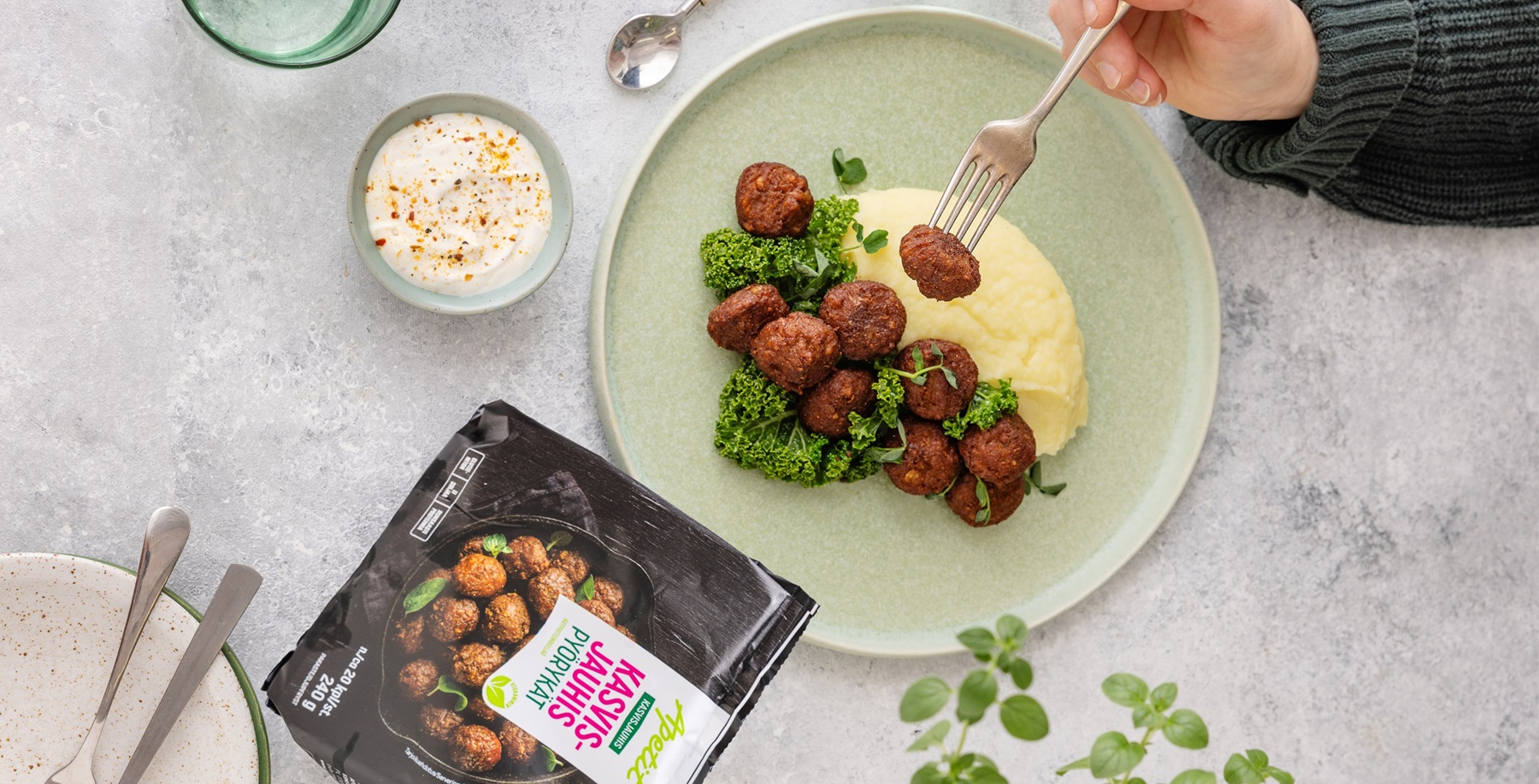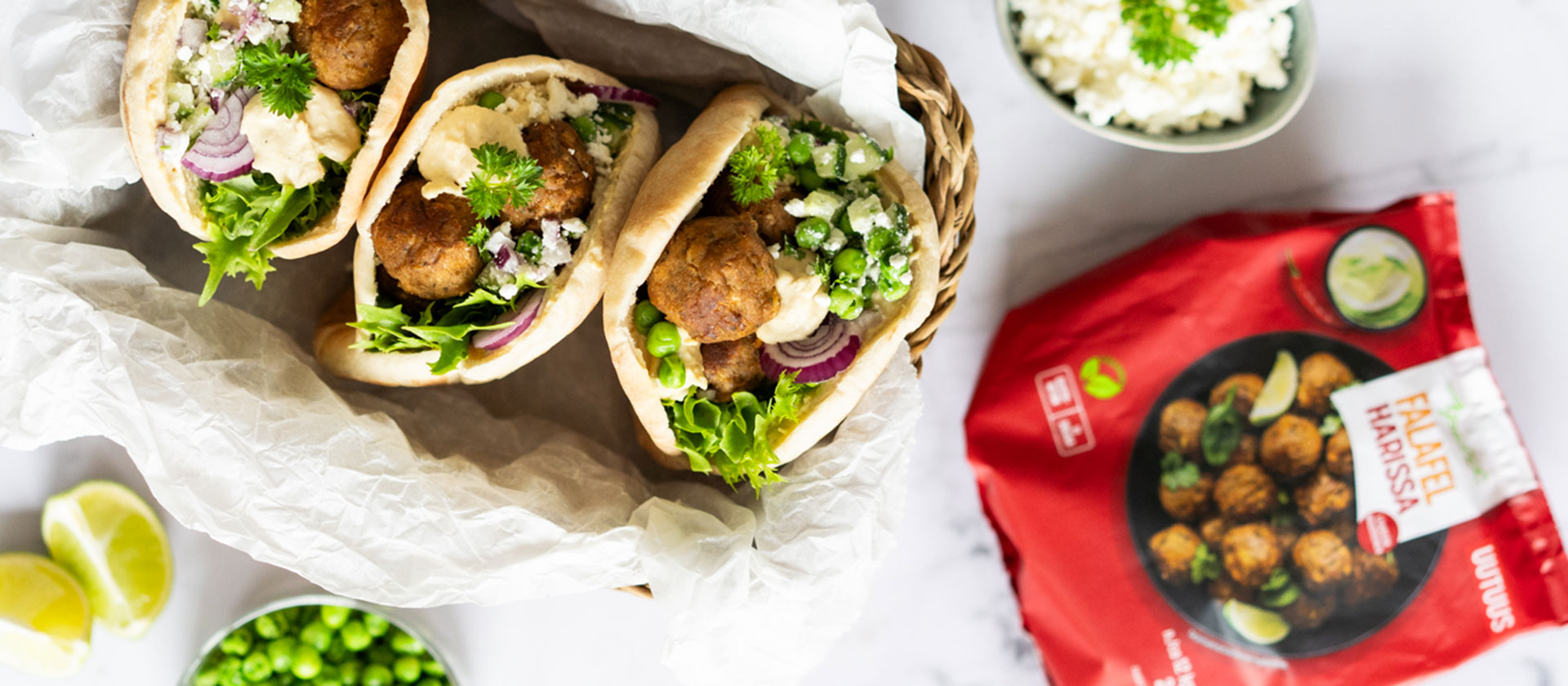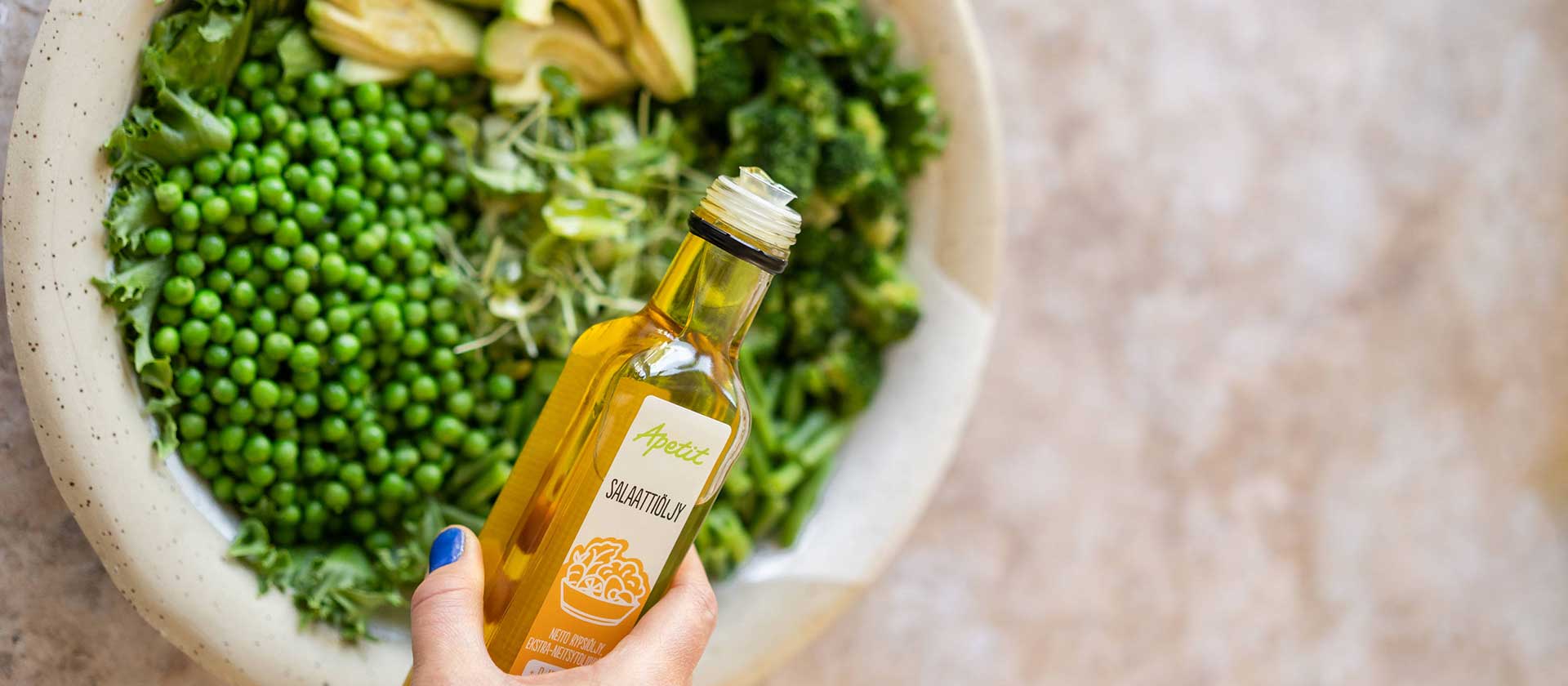CEO’s review Q4/2021
Esa Mäki, CEO:
“Apetit Group’s net sales in the fourth quarter were at the same level with the comparison period but profitability declined. Towards the end of the year, profitability was weakened especially by the rise in energy costs and the increase in the price of oilseed plant raw materials that had continued since the summer. At the annual level, our operating profit was lower than in the previous year due to the weak profitability of the Grain Trade business. The profitability of the Oilseed Products segment was burdened by the record-high raw material price and increased logistics costs. With regard to the refining margin, the situation will remain challenging early in the year. In Food Solutions, development has been, for the most part, very positive.
The retail demand for food remained strong until the end of the year. Demand in the Food Service channel also continued to recover. In food exports, we strengthened our position especially in the Swedish retail sector with new customer relationships. Although the pea harvest fell significantly short of the target, which reduced export volumes towards the end of the year, the total annual value of exports increased by 5 per cent. Profitability improved in all sales channels. Our delivery reliability has also remained at an excellent level.
In the Oilseed Products business, we continued our systematic work to commercialise the new rapeseed-based plant protein during the year. The small-scale production of the BlackGrain from Yellow Fields plant protein started in October 2021. The small-scale production enables customers to test BlackGrain in their own product development. At Apetit, BlackGrain was used for the first time in a commercial product in early 2022 as Apetit Vegetable Ball was launched for the HoReCa market.
The Kantvik bioenergy plant was commissioned towards the end of the year. The plant significantly reduces the Group’s CO2 emissions and energy costs. In the bioenergy plant, we can also make full use of production side streams, such as the straw that comes with seeds. The side streams account for about 10 per cent of the total fuel amount. The total value of the investment was approximately EUR 7 million.
We have succeeded in improving production efficiency throughout the Kantvik vegetable oil milling plant: records were achieved both in rapeseed milling and in oil refining. Increasing the cultivation of domestic oilseed plants in line with our goal supports our efforts to improve the profitability of the Oilseed Products segment in the new harvest season.
In December, Apetit Group’s subsidiary Avena Nordic Grain agreed on selling the Baltic operations of the Grain Trade business to Scandagra Group, which is a leading agriculture company in the Baltic countries. This business transaction is in line with our strategy and will make the Grain Trade business significantly healthier. The transaction is expected to be completed during the first quarter of the year.
The changing COVID-19 situation has required us to act flexibly and competently in implementing various exceptional arrangements. Regardless of this all, we have successfully achieved our goal of ensuring the health and safety of our employees and ensuring undisrupted operations throughout the food supply chain. For this, I would like to thank our personnel warmly.
In the corporate responsibility programme published in spring 2021, Apetit set targets for every stage of the value chain. An important goal is to reduce the climate impacts of our own operations. In this area, we have identified the impacts of energy consumption as essential. Significant investments in both Kantvik and Säkylä in the use of renewable energy and the development of energy and material efficiency reduce our climate impacts considerably. Put together, they will propel us towards our goal of reducing our own direct CO2 emissions by 75 per cent by 2025.”
Related articles

CEO’s review Q4/2024
Esa Mäki, CEO: “The full-year operating result from Apetit’s continuing operations improved from the comparison year. Food Solutions achieved a clear improvement in profit performance and Oilseed Products was slightly behind the comparison year’s result. The profit improvement in Food Solutions reflects the systematic work to improve profitability. Product portfolio management and product group-specific sales development have contributed to this profit improvement. The success of from field to freezer chain and harvest season production strengthened the result of Food Solutions. One factor behind the decline of the operating result in Oilseed Products was the decrease of market prices. The Group’s full-year net sales decreased clearly from the comparison year due to the decline in oilseed product market prices. In Food Solutions, net sales grew slightly from the comparison period. In both businesses, sales volumes declined mainly due to normal yearly fluctuations. Food Solutions performed more strongly than expected in the fourth quarter. Also Apetit’s operating result in the final quarter of the year improved from the comparison period. During the year under review, we promoted several strategically significant projects. The update of the Group’s ERP system progressed on schedule; deployment of the system in Food Solutions was carried out at the turn of September and October 2024. The project continues towards deployment of the ERP system in Oilseed Products during the second half of 2025. Deployment in Food Solutions was carried out successfully thanks to competent personnel and good planning. The bottling line at the Kantvik vegetable oil milling plant became operational as planned. With the new line, we are taking the supply chain of vegetable oils firmly into our own hands. In addition, the bottling line makes it possible to develop products with a higher degree of processing. The bottling line investment was realised as budgeted, amounting to approximately EUR 4.5 million. Thanks to the new bottling line, we have been able to reduce the amount of plastic we use in vegetable oil bottles by 41 per cent on average. One of Apetit’s strategic focus areas is More domestic plant proteins. We have taken steps in the commercialisation of our BlackGrain rapeseed powder. Development work has focused on improving the production process. We have started analysing different options for the production of BlackGrain plant protein. The analysis assesses potential partnerships and the organisation of production either through making an investment in the Kantvik vegetable oil milling plant or with purchased services. The analysis is expected to be completed in late 2025. The Finnish pea protein project is continuing as planned. In 2024, we conducted small-scale testing with Finnish raw materials to produce pea protein. Work carried out in the project has focused on trial runs and technology comparison to consolidate the competitive advantage. Increasing food exports and strengthening our position in Sweden is also one of our strategic focus areas. In order to achieve this goal, we established our own sales organisation in Sweden at the beginning of 2024. The strengthening of Apetit’s position in Sweden progressed. Besides retail, we have now expanded to Food service sector. We are pleased with the Finnish harvest season for both businesses. The frozen pea harvest from a record-large contract farming area was largely in line with expectations and the field-to-factory process ran smoothly. The root vegetable growing season was long, thanks to the warm autumn, and the quality and quantity of the harvest were mainly in line with the targets. According to the Natural Resources Institute Finland’s harvest forecasts, the total Finnish rapeseed harvest increased by more than a fifth. With regard to oilseed plants, things are developing in the right direction and we at Apetit are working to increase the cultivation of domestic oilseed plants. In both of our businesses, we want to use as much domestic raw materials as possible. Increasing the cultivation area of frozen peas and domestic oilseed plants is one of our strategic focus areas. The price increase of food stopped in 2024, but the higher price level is still reflected in consumer purchasing behavior. The new national nutritional recommendations published in the autumn recommend a varied diet with plenty of vegetables and adequate use of vegetable oils. Apetit focuses on domestic and plant-based raw materials as well as products that promote well-being and sustainable consumption. The cornerstones of Apetit’s product selection are relatively affordable and in many respects meet the requirements of consumers today: they are a responsible choice that supports people’s well-being and suit their budget in daily life. We expect demand to remain high in Apetit’s various product categories. At the beginning of the strategy period 2023–2025, we set the following financial objectives: operating result (EBIT) of more than EUR 9 million and return on capital employed (ROCE) of more than 8 per cent. By the end of 2024, we achieved the financial objectives set for the period. We will continue to develop Apetit in line with our vision: Growing and profitable market leader in plant-based products. I would like to take this opportunity to warmly thank all Apetit employees for the year 2024 and the owners, customers, contract growers and other partners for their cooperation.”

CEO's review Q3/2024
Esa Mäki, CEO: “Apetit’s operating result in the third quarter improved from the comparison period. In Food Solutions, operating result grew clearly year-on-year and the result of Oilseed Products was at the same level as last year. One of the factors behind the improvement in Food Solutions was the normal seasonal fluctuation between quarters. The Group’s net sales increased slightly from the comparison period. In Food Solutions, net sales grew especially in retail trade. Also in the Food service sector, development continued to be strong. In Oilseed Products, net sales were on a par with the comparison period. Apetit Group’s operating result in January–September improved from the comparison year and both businesses are ahead of the result for the comparison period. We continue to maintain our profit guidance, according to which the Group’s operating profit is estimated to be at the same level as in the comparison period. In the strategically important ERP project, the production implementation for Food Solutions was carried out successfully as planned. The critical production and order-delivery system functions were successfully deployed at the turn of September and October. Important support systems also came into use at the same time. The ERP project will continue according to the planned schedule until the second half of 2025, proceeding to the production implementation phase in Oilseed Products. The bottling line at the Kantvik vegetable oil milling plant has become operational as planned. The line will be up and running at full capacity in late 2024. The first new Apetit Kotimainen Rapeseed Oil bottles have been produced on the line, and they will gradually be rolled out to retail stores during the rest of the year. The bottling line enables a production method that significantly reduces the amount of plastic as well as logistic load associated with empty bottles. From now on, our plastic use will decrease on average by 41 per cent, taking into account all three sizes of Apetit’s rapeseed oil plastic bottles. The bottles receive their final shape only when they are on the bottling line, which significantly reduces the space required at all stages of the logistics chain. In addition to the new shape, all bottles have a new look and feel and are now part of the Apetit Kotimainen product family. The commercialization of BlackGrain rapeseed powder is progressing. Over the past year, work with BlackGrain has focused on developing the production process and starting production on a commercial scale. In addition to developing the production process, we have, for example, invested in developing the product's various use cases, both internally at Apetit and together with customers. The harvest season for field vegetables has progressed well. For domestic frozen peas, the harvest season was successful as a whole. We processed more frozen peas than in previous years and the field-to-factory process ran smoothly. For root vegetables, the situation looks good – the long, warm autumn contributed to their growth. Harvest-time production has proceeded as planned. The success of the harvest season will be ultimately determined by the harvest conditions in late autumn and preservation of processability until freezing. According to the harvest estimate of the Natural Resources Institute Finland*, the domestic turnip rape and rapeseed harvest is expected to increase by more than 40 per cent from last year, to 58 thousand tonnes. If the estimate is realised, the harvest would reach its highest level since 2018. The direction is good, but we hope that the turnip rape and rapeseed cultivation area and harvest volumes will continue to increase. The current level is not enough to cover Apetit’s targeted annual quantity of domestic raw materials. The sustainable cultivation level of domestic oilseed plants is also important for the security of supply. In the autumn, we launched new products into retail stores. In addition to the new rapeseed oil packaging, we are introducing a new Kotimainen Wok Vegetables mix, spicy Falafel Harissa balls and a hot Nduja Pepperoni pizza. We are also renewing our frozen soup selection, introducing a tomato and lentil soup that is perfectly suited to the new nutritional recommendations. Product development and the continuous renewal of the product selection play an important role in commercial success, alongside classic products.” *Natural Resources Institute Finland, harvest estimate 16.9.2024

CEO’s review H1/2024
Esa Mäki, CEO: "The operating result for the first half of the year was better than that of the comparison period. Both businesses have improved their operating result. We continue to maintain our profit guidance, according to which the Group’s operating profit is estimated to be at the same level as in the comparison period. The outlook for the harvest season is currently fairly good, but the possible realisation of risks related to harvesting will only be seen during the autumn. Net sales in the first half of the year declined, mainly due to lower market prices for oilseed products than in the comparison period. Apetit’s operating result for the second quarter of the year declined from the comparison period. In Oilseed Products, operating result clearly decreased in the second quarter of the year from the strong profits in the comparison period. The result was weakened by the fluctuation in sales volumes between comparison periods. In Food Solutions, operating result was at the same level as last year. The Group’s net sales decreased from the comparison period in the second quarter. The decrease was mainly due to the fall in the market prices of oilseed plants compared to the comparison period, sales volumes also decreased. There were normal fluctuations between comparison periods in the decline in the sales volumes, and no significant change can be seen in this year's production and sales amounts. In Food Solutions, the net sales were almost on a par with the comparison period. Sales volumes decreased from the comparison period. The decline in volumes was impacted by export sales of frozen peas that occurred at different times during the comparison period. The work on the new bottling line for the Kantvik vegetable oil milling plant is progressing. The construction work related to the property is in the final phase and the installation of equipment has started. The investment of approximately EUR 4.5 million is expected to be completed according to the original schedule in the second half of the year. The harvest season of Finnish field vegetables has progressed largely as planned. The hot and dry spring posed challenges for the growth of spinach and the first-sown peas, but the harvest outlook is mostly within expectations. The harvest outlook for root vegetables is also good before the harvest season. For the current harvest season, we increased the frozen pea cultivation area to 1,800 hectares. Domestic frozen peas play a central role in our strategy. By increasing pea cultivation, we want to meet the growing demand for exports. The cultivation areas for Finnish turnip rape and rapeseed increased from last year. The beginning of the harvest season was strained by drought, which caused uneven seedling emergence and pest pressure. After Midsummer, the weather has been more favourable for oilseed plants, and we believe that the harvest outlook in Finland is average. Our goal is to further increase the use of Finnish turnip rape and rapeseed at our vegetable oil milling plant. Domestic origin is a significant differentiating factor in vegetable oils. Work on Finnish cultivation development has continued at both the Räpi experimental farm and the RypsiRapsi forum’s cultivation tests. The focus of the RypsiRapsi forum’s trial activities during the current harvest season is on variety tests carried out as strip and square tests. In April, a multi-year project co-funded by the European Union was launched with the aim of increasing the cultivation reliability and volume of turnip rape and rapeseed in Finland. The project is a concrete demonstration of the desire to increase the cultivation of Finnish oilseed plants. The Räpi experimental farm has focused particularly on further research into pea varieties. The aim of the experiments is to find varieties that can withstand Finland’s changing cultivation conditions. In recent years, we have seen even greater variations in conditions, from heavy rain to heat and drought. Increasing pressures from diseases and pests are also taken into account in the variety tests. At Räpi, variety tests are carried out on carrots and swedes, for example, with the aim of finding new varieties for use by contract growers. We will continue to work on the focus areas in line with the strategy. For the BlackGrain rapeseed powder, the work has focused on developing the production process on a commercial scale. The pea protein project has continued small-scale testing to produce pea protein from Finnish raw ingredients. With both projects, we are increasing the opportunities for raising the added value of Finnish raw ingredients. The important ERP project has progressed according to schedule. The first phase of production implementation is scheduled to take place in the second half of the year. Some of Apetit’s operations have already implemented the new ERP system at the end of last year. Food inflation has slowed and turned negative in June. There are still major differences between product categories, and no significant change in consumer behaviour has been observed. Affordability is still an important criterion in purchase decisions. Apetit’s product range is well suited to the current situation. In the summer, we brought new vegetable oils to the shops. The Salad Oil and Pizza and Pasta Oil from Apetit’s Neito product family are high-quality new products that are suitable for a wide range of cooking and seasoning. The launches of new products will continue this year."
 Share
Share Facebook
Facebook
 LinkedIn
LinkedIn
 Email
Email

